B
y
\xa0Gloria Boamah KUSI
(Dr) &
Ing. Glenn GYIM
AH
(Reverend, Ph.D.), Green Transition Limited
One of the biggest environmental issues facing us this century is the worldwide garbage crisis.
Annually, more than two billion tons of municipal solid waste (MSW) are produced globally, with estimates suggesting this number will increase to 3.4 billion tons by 2050. The magnitude and immediacy of this problem are undeniable.

Disturbingly, at least 33 percent of worldwide waste is not handled in an environmentally secure way, leading to substantial health and ecological risks.
Across Africa, as urban areas expand rapidly, more than 125 million tons of waste are produced each year. However, fewer than 55 percent of these wastes get collected, and below 10 percent undergo recycling processes.
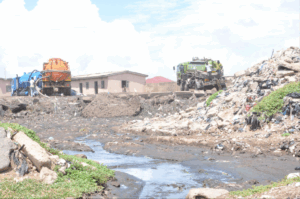
What remains is typically discarded openly or set ablaze, resulting in extensive contamination and the emission of greenhouse gases (GHGs).
Methane, mainly released through the decomposition of organic materials in landfills, along with nitrous oxide from unprocessed sewage, are strong contributors to climate change.
Methane possesses a global warming potential that is 25 times more significant than that of carbon dioxide over a century, which positions the waste industry as a substantial contributor to climate change. On a worldwide scale, waste accounts for roughly 3 to 5 percent of greenhouse gas emissions.
The consequences are significant for Africa, as the combination of inadequate waste management and growing susceptibility to climate change exacerbates the effects of floods, disease outbreaks, and water contamination.
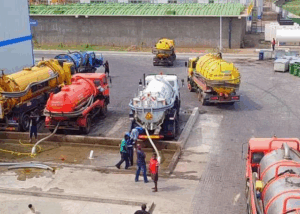
Tackling the waste crisis doesn’t just provide a remedy for environmental deterioration; it also presents a chance to combat climate change, particularly in lower-and middle-income nations like Ghana.
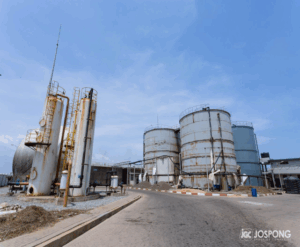
Ghana mirrors the difficulties encountered by numerous developing nations in handling both solid and liquid waste.
The urban centers of this nation, notably Accra, Kumasi, and Takoradi, have seen swift increases in both populace and industrial activities, surpassing the progress made in establishing sufficient waste handling facilities.
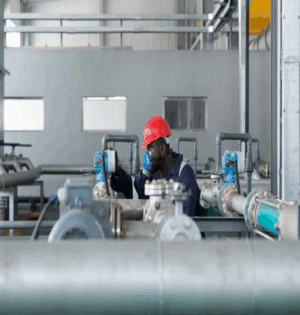
Consequently, the waste management system has heavily depended on ineffective and ecologically harmful methods like unrestricted dumping and unchecked landfills.
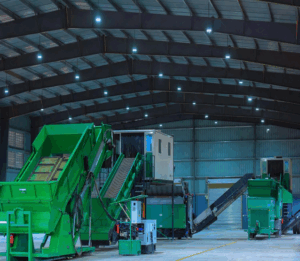
As a result, these methods have caused organic waste to build up in landfills. There, it breaks down without oxygen, emitting methane and nitrous oxide into the air.
Another significant issue is plastic waste, which blocks drainage systems, pollutes water bodies, and exacerbates urban flooding, especially during Ghana’s rainy periods. The inefficiencies seen in the management of solid waste also plague the handling of liquid waste.
For numerous years, Accra’s Lavender Hill gained notoriety as a site where raw sewage was dumped recklessly into the Atlantic Ocean. Each day, hundreds of trucks discharged untreated fecal waste, leading to significant marine contamination and presenting serious health hazards for nearby populations along the coast.
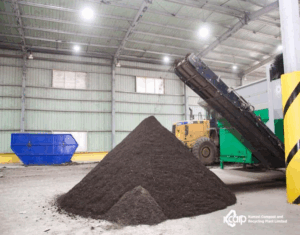
Lack of central sewerage infrastructure in many cities means that just a minor portion of wastewater undergoes treatment.
What remains ultimately ends up in rivers, lagoons, and underground water sources, leading to contamination of these waters and a rise in waterborne illnesses like cholera and typhoid fever.
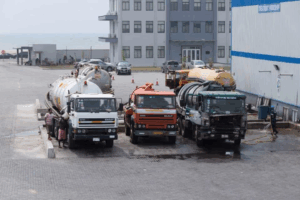
The consequences for public health and the environment due to these practices are far-reaching, spanning from ecosystem deterioration to higher healthcare costs and decreased productivity.
Moreover, the improper handling of waste intensifies both global and local climate effects, increasing Ghana’s susceptibility to climate change, especially in regions susceptible to floods and other severe weather conditions.
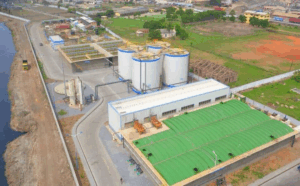
The waste sector contributes to about 12 percent of Ghana’s overall greenhouse gas emissions, as stated in the country’s Fourth National Greenhouse Gas Inventory Report.
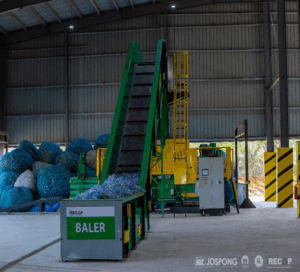
These emissions mainly arise from the anaerobic breakdown of organic waste in landfills and the inadequate treatment of liquid waste.
Even though it significantly contributes to emissions, the waste sector has historically garnered minimal focus in national climate plans.
Nonetheless, this trend is starting to shift as there is increasing acknowledgment that sustainable waste management presents a previously underutilized chance for lowering emissions, generating jobs, and enhancing climate resilience.
Ghana’s Nationally Determined Contributions (NDCs) under the Paris Agreement include waste management as a key intervention area. The country has committed to reducing emissions by 64 million tonnes of CO2 equivalent by 2030, with 24 million tonnes as an unconditional target.
Reaching this lofty objective necessitates novel strategies and robust collaborations between government bodies and businesses, which can harness technology, finance, and community involvement. Herein, the function of enterprises at the forefront of waste handling assumes significant importance.
A comprehensive strategy for managing waste is crucial to tackle the twin issues of environmental deterioration and climate change.
Top firms in Ghana have created an extensive waste management strategy that covers the whole waste cycle, from gathering and categorizing to recycling, composting, and treating both solid and liquid wastes.
By consistently investing in infrastructure, fostering innovation, and providing climate financing, waste can shift from being a burden to becoming a valuable asset, thus enhancing environmental conditions and supporting local communities.
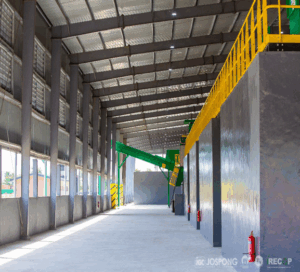
Waste management plants, spread throughout Ghana, provide extensive reach and efficient operation.
The facilities encompass Integrated Recycling and Compost Plants (IRECOPs), the Accra Compost and Recycling Plant (ACARP), the Kumasi Compost and Recycling Plant (KCARP), along with several medical and liquid waste treatment centers.
The combined architecture of these facilities enables concurrent handling of waste along with the extraction of useful materials like plastics, metals, and organic substances.
Redirecting organic waste away from landfills to compost facilities helps reduce methane emissions and promotes sustainable farming via the creation of natural fertilizers. Better sorting of waste at its origin boosts recycling efficiency and decreases the amount of leftover trash headed for ultimate disposal.
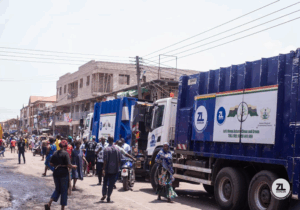
These waste management approaches are consistent with Ghana’s climate action plan, directly aiding in reducing emissions within the waste sector and promoting sustainable development.
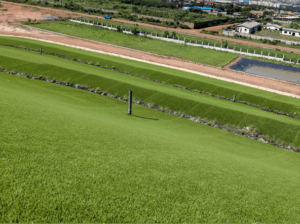
In addition to enhancing operations, novel strategies for climate financing and carbon trading are crucial for effectively merging waste management practices with climate objectives.
Through involvement in carbon credit initiatives, Ghana is emerging as a leader in climate financing, highlighting how effective waste management can be crucial for the country’s climate strategy.
Within the structure provided by Article 6 of the Paris Agreement, enabling the exchange of internationally certified emission reduction outcomes (ITMOS) among nations, Ghana is at the forefront of developing carbon credit systems linked with projects aimed at diverting waste and enhancing resource recovery efforts.
Two of Ghana’s authorized ITMO projects—focused on waste-to-compost and alternative wetting and drying for rice cultivation—are projected to reduce 2.7 million tonnes of CO2 equivalent by 2030.
This reduction is comparable to the annual carbon sequestration capacity of approximately 128.6 million mature trees.
Through the creation of certified carbon credits, Ghana plays a part in global reduction initiatives while simultaneously opening up avenues for eco-friendly employment, sustainable finance, and economic stability in the realm of waste management.
Moreover, the revenue from selling these credits funnels funds back into developing more infrastructure, guaranteeing the sustainability of waste management systems over the long term.
Managing liquid waste is also a vital aspect of enhancing climate resilience and improving public health.
Through the rejuvenation of areas such as Lavender Hill in Accra and transforming these locations into contemporary waste management plants, Ghana has achieved significant advancements in tackling unprocessed sewage.
The Accra Sewerage Systems Ghana Limited (SSGL) facility handles more than 2,400 cubic meters of fecal sludge each day, transforming it into safely treated wastewater and organic residue.
The treatment method generates biochar that can improve soil fertility and help capture carbon.
Acknowledging the necessity for decentralized waste management strategies, comparable installations have been set up in various urban centers like Kumasi, Takoradi, and Tamale.
These plants employ anaerobic digestion along with various biological treatments to decompose organic material, collecting methane gas that can then be used for producing energy.
Consequently, these facilities decrease methane emissions, enhance sanitary conditions, and foster sustainable energy generation, thus directly supporting Ghana’s climate change mitigation initiatives.
Through the development of these facilities, Ghana is simultaneously fostering climate-resilient urban environments. A robust waste management system helps curb the impacts of climate-triggered floods and diminishes health hazards, thereby enhancing the overall wellness of city dwellers.
This enhances the durability of cities and guarantees they can more effectively endure upcoming climate effects.
One of the key tenets of the waste management approach in Ghana aligns closely with circular economy concepts. By reclaiming and converting waste into reusable materials and goods, this strategy minimizes dependence on raw resources and promotes more environmentally friendly manufacturing processes.
Organic waste is transformed into compost for fertilizers, plastics undergo recycling processes, and sludge is turned into biochar. This method ensures that waste does not end up in landfills and instead creates a cycle where waste production leads back to resource utilization.
This circular model leads to substantial job creation, especially within the informal sector. Activities such as waste collection, sorting, and processing result in numerous direct and indirect positions throughout Ghana.
These opportunities are bolstered by training initiatives designed to empower local communities with the necessary skills for engagement in the green economy. This shift towards a more sustainable, eco-friendly economic model ensures inclusivity and fairness, thereby aiding marginalized groups while simultaneously advancing national progress.
The waste management approaches adopted in Ghana align with both the nation’s developmental goals and its international environmental pledges.
Waste management efforts play a direct role in achieving various goals set forth in Ghana’s Nationally Determined Contributions (NDCs). These include better landfill management practices, waste conversion into compost, and upgraded sanitation facilities.
These steps help achieve the nation’s primary objective of decreasing greenhouse gas emissions and enhancing overall environmental conditions.
On the international scene, Ghana’s initiatives align with multiple United Nations Sustainable Development Goals (SDGs). These encompass SDG 6 (Clean Water and Sanitation), SDG 11 (Sustainable Cities and Communities), SDG 12 ( Responsible Consumption and Production), and SDG 13 ( Climate Action).
Ghana is advancing significantly towards meeting both national and international objectives for environmental sustainability and resilience by merging waste management practices with efforts aimed at combating climate change and promoting sustainable development.
To expand and duplicate effective waste management strategies throughout Africa, various crucial policy supports are essential.
This encompasses the implementation of compulsory waste sorting measures, rewards for private sector involvement, regulations governing carbon credit exchanges, as well as funding for digital systems to monitor waste movement and emission levels.
Public-private collaborations will play a key role in closing financial shortfalls and securing the sustained functionality of waste management infrastructures.
Digitization presents a significant chance to boost transparency and effectiveness in waste management. Advances like remote surveillance systems, intelligent waste collection methods, and blockchain-driven carbon credit ledgers can greatly strengthen responsibility and efficiency.
Integrating data into waste management planning and decision-making allows for optimization of system efficiency and ensures the attainment of national goals related to emission reductions.
Ghana’s waste management industry is experiencing a shift that tackles current issues related to garbage disposal and hygiene while simultaneously supporting larger objectives of climate adaptability and sustainable progress.
By combining proper infrastructure, innovative solutions, and strategic investments, waste has the potential to shift from being a significant environmental and public health problem to becoming a key catalyst for climate initiatives and economic development.
Ghana’s experiences provide important insights for nations facing comparable issues, offering a blueprint for establishing climate-adaptive and sustainable urban infrastructures that can fulfill both regional and international environmental objectives.
As the world faces the combined crises of waste management and climate change, Ghana’s efforts present a hopeful vision for the future, where waste is not only a problem to be managed but a resource that drives positive change.
Provided by SyndiGate Media Inc. (
Syndigate.info
).


Leave a Reply